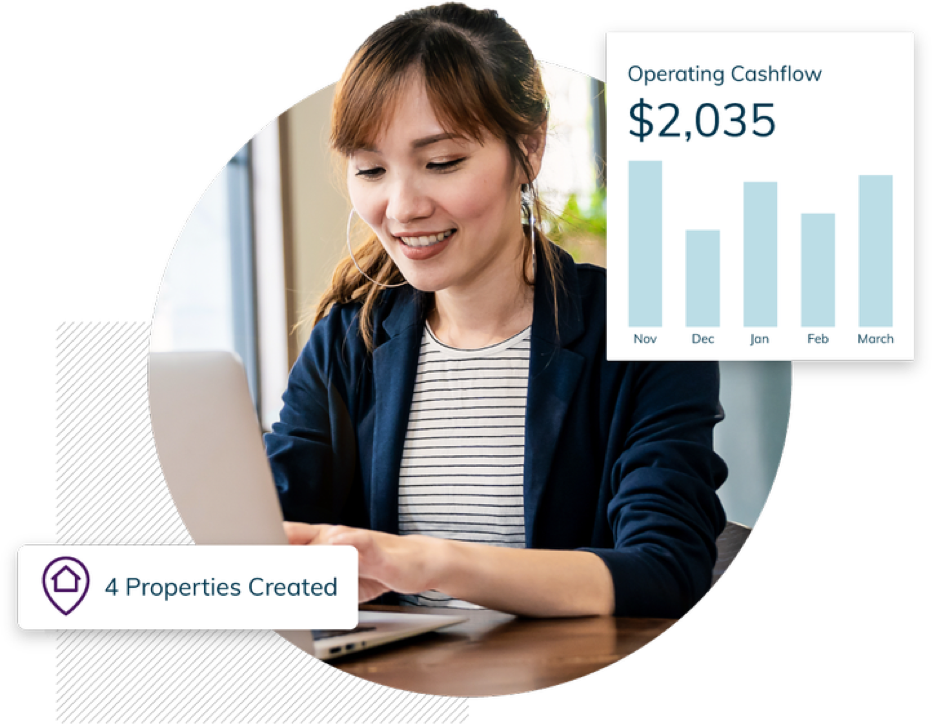16 min read
24 Best Real Estate Investor Websites: Streamlining Your Investment Journey
Real estate investors are a motivated bunch, and finding websites with resources that expedite the wealth-building journey can help add fuel to...

Staying on top of rental property accounting is like mowing an overgrown lawn. Every rent payment, expense, and wayward deduction represents blades of uncontained grass that scatter across your yard (or desk) if uncaptured.
The best property management accounting software is your liberator from the scattered mess of rental property accounting. It’s like having a bag to collect all those blades of grass to keep your yard (or desk) clean. And when tax season rolls around, you’ll your accounting specifics neatly organized in one place, making clean-up a breeze.
If you’re ready to take care of your overgrown accounting situation without relying on spreadsheets and unorganized smartphone photo libraries filled with receipts, keep reading for the best accounting software for property management.
Like in our example above, the ability to filter all your disparate accounting needs into a single location keeps you organized as you move throughout the year.
Rather than piling expense receipts into a shoebox, manually tracking rent payments, and storing invoices haphazardly in a Google Drive, you can effortlessly automate these processes with integrated property management and accounting software.
When you integrate property management software with accounting software, rent payments and expenses flow directly from your your management dashboard into your accounting solution automatically. It’s like upgrading from a pushmower and rake to a riding lawnmower.
Think of each property management feature as a blade on the underside of your John Deere. Each blade helps you get more done with each pass.
User-friendly accounting software for property management ensures that people who may not be incredibly tech-savvy get all the benefits of automated accounting software without needing to call up their techy grandson or pulling their hair out when something just doesn’t work.
It’s a pain to manually track each rent payment and expense and enter those values into a software system. The best property management accounting software imports data automatically from property management solutions, saving you time.
Property management accounting software goes beyond basic accounting. It tracks finances by property, giving you cash flow insights for each unit. This data helps optimize rents and expenses, feeds into profit and loss (P&L) reports, and simplifies tax filing with Schedule E reports.
Secure data storage provides a fortress for your financial information and tenant data. Look for features with encryption and access controls to ensure only authorized users can view sensitive details. This robust security keeps your finances and renters’ information safe, giving you peace of mind.
Look for cost-effective solutions, not only in terms of cost but also time. Automated rent and expense tracking reduces errors and streamlines accounting. By saving time and minimizing mistakes, you’ll maximize your return on investment.
QuickBooks is like that old, reliable lawnmower you keep in the garage — you’ll need to fiddle with it to get it up and running. Ultimately, however, QuickBooks isn’t explicitly designed for rental accounting.
With QuickBooks, you can categorize a number of property management tasks, but they’ll have to filter through non-rental-specific naming conventions. For example, properties you manage will be called “Customers,” tenants are categorized as “Customer: jobs of properties,” and property owners are titled “Vendors.”
It can get a little confusing, especially if you’re new to QuickBooks. Once you’re up and running, though, you can track transactions related to the following:
Depending on who you choose to act as your property management software provider, you can integrate QuickBooks with that provider to streamline your accounting processes. If you don’t utilize this class of software, you’ll have to complete these processes manually, either by referring to spreadsheets or combing through receipts, invoices, and others.
In short, landlords can use QuickBooks as their rental property accounting software, but they might feel it’s limited compared to solutions built specifically for property management.
Using Zoho Books for property management is like hiring a lawn service company. You get the essential accounting features you’d expect. Plus, Zoho Books brings with it an entourage of specialized integrations, kind of like a lawn service company brings in a crew to complete individual tasks like edging or weed whacking.
For example, with the standard version of Zoho Books, you’ll have the ability to:
In general, Zoho Books itself isn’t tailored to rental property management. However, you can pair Zoho Books with prebuilt Zoho Creator templates specifically designed for rental property accounting. You can also peruse the Zoho Marketplace for pre-built apps.
Back to Zoho Creator, though. It has a Property Management add-on that enables landlords to:
But keep in mind that these add-ons could require some low-level coding skills. If you want to get up and running immediately, you might need a solution different from Zoho and its software collection. Several pre-built property management software solutions can help you get right to work faster.
FreshBooks is a bit like Zoho Books in that it’s an online accounting software with a number of integrations. If FreshBooks were a lawn service crew and helpers were like integrations, then FreshBooks would have even more lawn care workers at its disposal than Zoho Books.
In terms of property management accounting, you’ll get a number of features to help you operate your business more efficiently. FreshBooks provides landlords with streamlined features such as:
One thing you won’t find with FreshBooks is pre-built property management functionality that integrates directly with tools to help you acquire and manage leads. However, it does cover a number of tax-related needs to help you take the stress out of tax time, which you’ll generally find in this category.
So, while FreshBooks does provide accounting functionality, if you want to combine all your property management needs, you won’t find that functionality unless you find an integration, which we couldn’t readily find in their marketplace.
Like FreshBooks and Zoho Books, Xero is purpose-built accounting software. One thing that stands out is that Xero is designed with accountants and bookkeepers in mind.
To return to our lawncare theme, Xero is like a souped-up riding mower with all the fancy upgrades. Plus, it knows a guy who can help with rental property management. In other words, it directly integrates with Landlord Studio to streamline accounting and property management.
Within the core Xero accounting product, features that stand out for landlords include:
Then, when you integrate with Landlord Studio, you gain the following capabilities:
If you need a suite of very powerful accounting features, consider Xero. Combine it with Landlord Studio, and you will have a solution that syncs data between services for automated workflows.
Keep in mind that integrating with Landlord Studio will require a separate fee. Landlords can manage their first three units in their Go tier for free, but they won’t have access to showing scheduling, unlimited document storage, and more.
If you upgrade to the Pro tier for $12 a month, you can manage three units and use services that Go doesn’t offer, like automated rent reminders. Neither tier currently currently offers e-signatures or lease agreements.

Finally, we arrive at TurboTenant. TurboTenant and its integration with REI Hub is like hiring a landscape architect to overhaul your yard completely.
Let’s go over TurboTenant’s free tier first. It enables landlords to complete critical property management tasks that DIY landlords need to streamline now and in the future as they grow.
With the free tier, landlords enable access to the following, all without a credit card:
When you pair TurboTenant with REI Hub, you’ll automate your property’s most critical rental accounting aspects in a clean and easy-to-use interface. With TurboTenant and REI Hub, landlords can:
Refrain from letting your rental property accounting turn into a tangled mess; property management accounting software acts like a lawnmower, controlling your finances.
While established options like QuickBooks offer robust features, they aren’t specifically designed for something other than landlords. Other solutions require technical expertise or lack built-in property management functionalities.
For a user-friendly and comprehensive solution, consider TurboTenant. It boasts a free tier with essential features and seamlessly integrates with REI Hub for automated expense tracking, insightful reporting, and effortless bank account syncing. Take control of your finances and free up valuable time.
Try TurboTenant and REI Hub today for your accounting software for property management needs.
TurboTenant is designed to streamline property management processes, offering a range of features to assist landlords in managing their rental properties efficiently. When it comes to accounting software compatibility, here are some common questions and answers.
TurboTenant’s primary focus is on property management features. Currently, there are no direct integrations with major accounting software beyond the REI Hub platform, which offers accounting-specific features for rental property management.
TurboTenant is not directly integrated with QuickBooks. However, landlords can use QuickBooks alongside TurboTenant to manage accounting tasks separately.
16 min read
Real estate investors are a motivated bunch, and finding websites with resources that expedite the wealth-building journey can help add fuel to...
11 min read
Despite the unique benefits that VA loans offer service members and veterans, around 82% of eligible veterans aren’t taking advantage of them....
14 min read
It may seem obvious, but collecting rent is one of the most critical aspects of property management. Tenants who fail to pay rent can...
Join the 700,000+ independent landlords who rely on TurboTenant to create welcoming rental experiences.
No tricks or trials to worry about. So what’s the harm? Try it today!
TurboTenant, Inc., © 2025
Created in Sunny Colorado